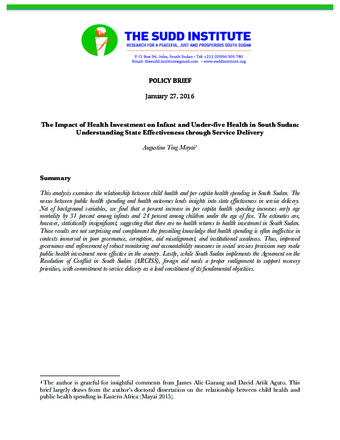The Impact of Health Investment on Infant and Under-five Health in South Sudan: Understanding State Effectiveness through Service Delivery
Publication Summary
This analysis examines the relationship between child health and per capita health spending in South Sudan. The nexus between public health spending and health outcomes lends insights into state effectiveness in service delivery. Net of background variables, we find that a percent increase in per capita health spending increases early age mortality by 31 percent among infants and 24 percent among children under the age of five. The estimates are, however, statistically insignificant, suggesting that there are no returns to health investment in South Sudan. These results are not surprising and complement the prevailing knowledge that health spending is often ineffective in contexts immersed in poor governance, corruption, aid misalignment, and institutional weakness. Thus, improved governance and enforcement of robust monitoring and accountability measures in social services provision may make public health investment more effective in the country. Lastly, while South Sudan implements the Agreement on the Resolution of Conflict in South Sudan (ARCISS), foreign aid needs a proper realignment to support recovery priorities, with commitment to service delivery as a lead constituent of its fundamental objectives.
Augustino Ting Mayai's Biography
Augustino Ting Mayai is the former Managing Director of the Sudd Institute. He is a founding Research Director of the same institution, serving in this capacity for a decade. He holds a Ph.D. in Sociology, with concentrations on demography and development from the University of Wisconsin-Madison. He currently studies how state effectiveness affects child health outcomes in South Sudan and Ethiopia. Dr. Mayai has written extensively on South Sudan’s current affairs. August is the current Chair (Statistician General) of the National Bureau of Statistics, Government of South Sudan.

